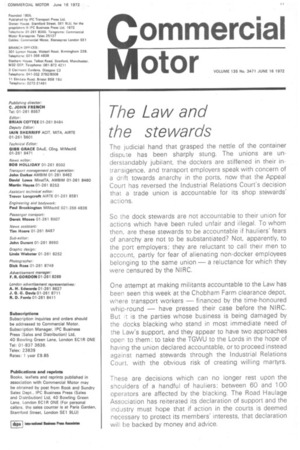The Law and the stewards
Page 13

If you've noticed an error in this article please click here to report it so we can fix it.
The judicial hand that grasped the nettle of the container dispute has been sharply stung. The unions are understandably jubilant, the dockers are stiffened in their intransigence, and transport employers speak with concern of a drift towards anarchy in the ports, now that the Appeal Court has reversed the Industrial Relations Court's decision that a trade union is accountable for its shop stewards' actions.
So the dock stewards are not accountable to their union for actions which have been ruled unfair and illegal. To whom then, are these stewards to be accountable if hauliers fears of anarchy are not to be substantiated? Not, apparently, to the port employers; they are reluctant to call their men to account, partly for fear of alienating non-docker employees belonging to the same union — a reluctance for which they were censured by the NIRC.
One attempt at making militants accountable to the Law has been seen this week at the Chobham Farm clearance depot, where transport workers — financed by the time-honoured whip-round — have pressed their case before the NIRC. But it is the parties whose business is being damaged by the docks blacking who stand in most immediate need of the Law's support, and they appear to have two approaches open to them: to take the TGWU to the Lords in the hope of having the union declared accountable, or to proceed instead against named stewards through the Industrial Relations Court, with the obvious risk of creating willing martyrs.
These are decisions which can no longer rest upon the shoulders of a handful of hauliers; between 60 and 100 operators are affected by the blacking. The Road Haulage Association has reiterated its declaration of support and the industry must hope that if action in the courts is deemed necessary to protect its members' interests, that declaration will be backed by money and advice.




























































































